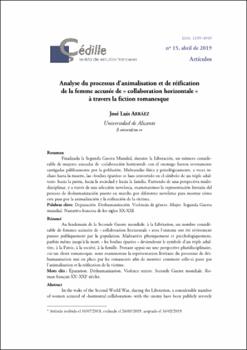Analyse du processus d’animalisation et de réification de la femme accusée de « collaboration horizontale » à travers la fiction romanesque
Author
Arráez Llobregat, José LuisDate
2019Abstract
Finalizada la Segunda Guerra Mundial, durante la Liberación, un número considerable de mujeres acusadas de «colaboración horizontal» con el enemigo fueron severamente
castigadas públicamente por la población. Maltratadas física y psicológicamente, a veces incluso hasta la muerte, las «boches épurées» se han convertido en el símbolo de un triple adulterio: hacia la patria, hacia la sociedad y hacia la familia. Partiendo de una perspectiva multidisciplinar, y a través de una selección novelesca, examinaremos la representación literaria del
proceso de deshumanización puesto en marcha por diferentes novelistas para mostrar cómo
esta pasa por la animalización y la reificación de la víctima. Au lendemain de la Seconde Guerre mondiale, à la Libération, un nombre considérable de femmes accusées de « collaboration horizontale » avec l’ennemi ont été sévèrement
punies publiquement par la population. Maltraitées physiquement et psychologiquement,
parfois même jusqu’à la mort, « les boches épurées » deviendront le symbole d’un triple adultère, à la Patrie, à la société, à la famille. Prenant appui sur une perspective pluridisciplinaire,
via un choix romanesque, nous examinerons la représentation littéraire du processus de déshumanisation mis en place par les romanciers afin de montrer comment celle-ci passe par
l’animalisation et la réification de la victime. In the wake of the Second World War, during the Liberation, a considerable number
of women accused of «horizontal collaboration» with the enemy have been publicly severely punished by the population. Arrested without warrant, then physically and psychologically
bad treated, even till death, «the clean beasts» will become the symbol of a triple adultery, to
the Country, to society and to the family. Starting from a multidisciplinary perspective, and
through a novelesque selection, we will examine the literary representation of the dehumanisation process set up by novelists to show how this goes through the victim’s animalization
and reification.





